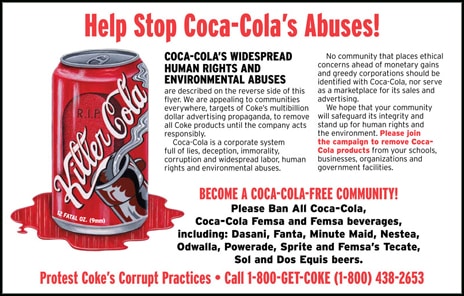
The vast Coca-Cola empire comprises 450 different brands and a stunning number of products, including 3,500 separate and distinct beverages. Imagine that! If you tried a different Coca-Cola brand every day, at the end of a year there would still be almost 100 to go. And to try a different one of the corporation’s drinks every day would take almost 10 years!
Coca-Cola makes products whose names begin with every letter of the alphabet except X and Z, which is rather strange, because it has long been an article of faith among manufacturers that consumers, especially immature consumers, love to buy stuff that starts with Z or X.
All very interesting, but there are big problems with what’s inside those carefully designed and ingeniously marketed products, and with how the products come into being. There are reasons why some people call the corporation “Killer Coke.” Here is another strange thing — most of those reasons have nothing to do with nutrition or the lack thereof, or with childhood obesity. KillerCoke.org tells visitors that its website offers…
… up-to-date news, reports and other information that shows the world of Coca-Cola is a world full of lies, deception, immorality, corruption, and widespread labor, human rights and environmental abuses, and that Coke has inflicted great hardship and despair upon many people and communities throughout the world.
There is a section on health issues, and it’s brutal. The KillerCoke people say,
Coca-Cola remains under fire for producing unhealthy products that are fueling the obesity and diabetes epidemic throughout the world because of the high sugar and caloric content… In the United States, because of public pressure, Coca-Cola has had to less aggressively market their products to children. However, around the world, the company continues to push their products to addict children where that pressure does not exist. To Coke executives and board members, profits take precedence over morality, ethics and the well-being of children.
KillerCoke.org does not hesitate to say the A-word. Its members believe Coca-Cola wants to turn kids into addicts. They believe there is such a thing as food addiction. There is another A-word, aspartame, whose name has been changed to yet another A-word, AminoSweet. This is to fool any consumers who may have heard that aspartame is bad and who might be trying to avoid it. And, good grief, another A-word, advertising, like the allegedly false advertising for the so-called VitaminWater, concerning which some lawsuits are underway.
The site also archived a shocking article written by Tracy Fernandez Rysavy, which doesn’t seem to even exist any longer at its original home, Real Money. Titled “The Sinister Side of Soda,” it goes into detail about the dangers of aspartame, suggests a cancer risk from benzene, and deplores the damage done to the users’ teeth by the sugar and acid in sweet, fizzy drinks.
Rysavy cites the Beverage Marketing Corporation’s claim that the average American drinks more than 50 gallons of soda pop every year. Yikes!
Among other alarming things, the writer says,
A study of six- to 13-year-olds published in the Archives of Pediatrics & Adolescent Medicine found that those who drank more sweetened beverages, including soda, drank less milk. Those who drank an average of 20 ounces of soda a day had lower intakes of calcium, magnesium, zinc, vitamin A, and other vital nutrients.
Yesterday, we talked about the ABC News report by Dan Harris and Maggy Patrick, “Is ‘Big Food’s’ Big Money Influencing the Science of Nutrition?” They mention an authority who is both respected and reviled, who seemingly embodies “conflict of interest” in several ways, saying,
David Allison is a renowned scientist who runs an obesity research center at the University of Alabama in Birmingham. He has a 108-page resume…
On the other hand, Dr. Allison has collected fees from more than 100 organizations, mainly weight-loss companies. (And some people say, why not? He was, after all, honored by the national administration with a Presidential Award for Excellence in Science, Mathematics and Engineering Mentoring.) According to Harris and Patrick,
Critics say Allison is part of a concerted effort by big food to co-opt scientists not only by funding their research but by offering them lucrative speaking and consulting deals, in an effort to confuse U.S. families about the health effects of popular food products.
One reason Dr. Allison is controversial is that he resists the almost universal opinion that soda pop makes kids and grownups fat. In this, he disagrees with the Centers for Disease Control and just about every other authority. Why is Dr. Allison an unbeliever? Is it because he’s on the payroll of the American Beverage Association and both Pepsi and Coca-Cola? Is it because, as he says, the research to prove a link between obesity and fizzy, sweet drinks has not been rigorous enough? Is he simply in denial, or what?
Your responses and feedback are welcome!
Source: “Coca-Cola Beverages = Colossal Health Hazards,” KillerCoke.org
Source: “The Sinister Side of Soda,” KillerCoke.org, 2007
Source: “Is ‘Big Food’s’ Big Money Influencing the Science of Nutrition?,” ABC News, 06/21/11
Image of Killer Cola Flyer, used under Fair Use: Reporting.

 FAQs and Media Requests:
FAQs and Media Requests: 











